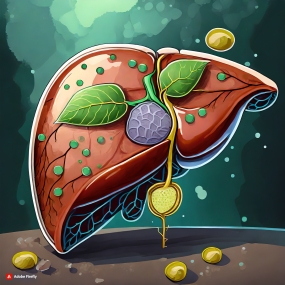Hepatitis is an inflammation of the liver. It can be caused by many things, including infection with a virus such as hepatitis A, B or C. Symptoms of hepatitis can include excessive fatigue, abdominal pain, nausea, vomiting, fever, digestive problems and loss of appetite. If you think you may have hepatitis, it's important to see a doctor for diagnosis and treatment.
What are the different types of hepatitis ?
There are several types of hepatitis, each caused by a different infectious agent. The most common is hepatitis A, which is caused by the hepatitis A virus (HAV). Hepatitis B is caused by the hepatitis B virus (HBV), while hepatitis C is caused by the hepatitis C virus (HCV). There are also other types of hepatitis, such as hepatitis D (HDV), which can only develop in people who are already infected with HBV, and hepatitis E (HEV), which is mainly found in regions with poor hygiene.
Origins of hepatitis viruses : how are they transmitted ?
Hepatitis viruses can have different origins. The hepatitis A virus (HAV) is generally transmitted by ingesting food or water contaminated by the stools of an infected person. The hepatitis B virus (HBV) can be transmitted through blood and body fluids, for example during needle exchange or unprotected sex. Hepatitis C virus (HCV) can also be transmitted via blood, usually through contaminated blood transfusions or unsterilized medical instruments. Other types of hepatitis can also be caused by other viruses, such as hepatitis D virus (HDV) and hepatitis E virus (HEV).
What are the symptoms ?
Symptoms of hepatitis can vary depending on the type of hepatitis and the severity of the infection. In general, symptoms of hepatitis can include excessive fatigue, abdominal pain, nausea, vomiting, fever, digestive problems and loss of appetite. Other symptoms may include dark urine, light-colored stools, yellow skin and eyes (jaundice), inflamed lymph nodes, and joint and muscle pain. If you notice these symptoms, it's important to consult a doctor for diagnosis and appropriate treatment.
Plants and hepatitis : are there any natural remedies ?
There are several herbs that have been used to treat hepatitis. Some of these include turmeric, rosemary, dandelion, chamomile, artichoke, peppermint and green tea. However, it's important to note that these herbs are not considered medical treatments for hepatitis, and it's important to consult a physician for diagnosis and appropriate treatment. In general, it is recommended not to use herbs to treat a serious illness without a doctor's approval.
Hygienic and dietary rules to prevent hepatitis
There are a number of health and diet rules that can help prevent hepatitis. These rules include the following :
- Avoid risky behaviors that can expose you to hepatitis, such as injecting drugs or sharing injection equipment with others.
- Pay attention to personal hygiene, washing your hands regularly and avoiding sharing toiletries with others.
- Avoid excessive alcohol consumption, which can aggravate the liver damage caused by hepatitis.
- Eat a healthy, balanced diet, rich in fruits, vegetables and whole grains, to help keep your liver healthy.
- Drink plenty of water to avoid dehydration and help your liver function properly.
- If you have hepatitis, avoid handling raw or undercooked foods, especially animal products, to avoid contaminating others.
It's also important to consult a doctor to receive a diagnosis and appropriate treatment for hepatitis.
Updated on 31 October 2023 at 16:22







